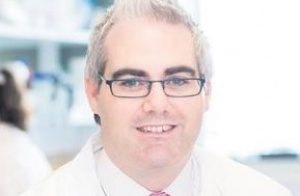Role: Lecturer in Molecular Oncology
Company: Cancer Focus Northern Ireland
Track Record: ‘There are a number of rewards. It’s very cool when you discover something and you suddenly realise you’re the first person in history to know or understand it. But the most rewarding thing about my job is knowing you are part of something that could real
What does your job entail?
My official title is ‘Cancer Focus Northern Ireland Lecturer in Molecular Oncology’. However, lecturer is a rather loose academic label and can actually cover anything from full-time research to full time teacher within the university. My job is predominantly research focused and I work within the Centre for Cancer Research and Cell Biology at Queen’s University, Belfast (QUB) where I carry out re-search focused on understanding how cells respond to, and repair, damaged DNA. This is because the same genes that regulate how cells respond to DNA damage are often turned off in cancers and it’s often the loss of these genes that helps cancers develop, spread or respond to specific treatments. I believe a deeper under-standing of these pathways within cancer cells will help us both prevent and treat these cancers in the future.
Is it 9-5?
Not really, hours-wise I usually start around 8am and finish at about 6pm, but what I do within my day can vary from carrying out different types of experiments (from looking down a microscope to mixing things in test tubes), writing and reading research papers, giving presentations about my research to colleagues and even teaching PhD students how to perform and interpret different types of experiments, hopefully inspiring another generation of successful cancer researchers.
How did you get into this line of work?
The human body and how it works has always fascinated me. I originally wanted to study medicine; however, in Queensland (the state I’m from in Australia) medicine is a postgraduate course (meaning you have to have some sort of degree before you can enter the course).
Because of this I originally studied biomedical science at Griffith University gaining a first class honours degree. The research project I carried out during my honours year — examining the function of the hereditary breast cancer gene BRCA1 — really spurred my interest in cancer research but I still had a keen interest in medicine. As I was interested in both medicine and medical research, I then went on to complete a Bachelor of Medicine, Bachelor of Surgery degree combined with a PhD in breast cancer cell biology at the University of Queensland and the Queens-land Institute of Medical Research.
Outline your career to date
After completing my university training in Australia, I moved to Belfast to work as a research fellow under the mentorship of Professor Paul Harkin, a world leader in hereditary breast and ovarian cancer research. I worked in this post for five years before being awarded a research fellowship from Cancer Focus Northern Ireland, which has allowed me pursue my career as an independent researcher.
What qualities are required for your job personal and professional?
You need a wide range of skills from understanding experimental theory to hands-on practical skills in order to carry out various experiments. You also need to be a good communicator to enable you to express your ideas and theories to your team and colleagues, and the wider scientific community through writing and publication of scientific papers. Part of my role also involves training the next generation of cancer researchers and I think that one of the key skills in this career is being a good and enthusiastic teacher. I would also consider patience an important personal skill required for this job. Progress can be slow in cancer research and some projects can take many years so patience is key.
What are the biggest re-wards and the biggest challenges of your work?
There are a number of rewards. It’s very cool when you discover something and you suddenly realise you’re the first person in history to know or understand it.
But the most rewarding thing about my job is knowing that you’re part of something that could really make a difference to the lives and families of people affected by cancer. The toughest and most challenging aspect of my work has to be securing funding for your research and your group. I spend a lot of time applying for grants but the chances of being successful are slim. You might get one in every 12.
It’s very stressful knowing you have exciting research you want to do and that other people’s jobs depend on getting the money in. I’m very grateful to Cancer Focus NI for investing £400,000 of funding in my work and to all the fundraisers who organised a ‘Girls’ Night In’ to help to make that possible.
What is the best advice you’ve ever received?
“There’s nothing you can’t do if you put your mind to it”. This piece of advice has spurred me on many times.
What do you like to do your spare time?
I really enjoy spending time with my family and my two dogs. They keep me fit — my two dogs I mean!
Who has inspired you most in your life?
Many, many people have in-spired me throughout my life. I’m just always in awe of people who have the focus and energy to do anything they set out to do.
Cancer Focus NI is asking women across Northern Ireland to organise a ‘Girls’ Night In’ to support Dr Savage’s pioneering breast cancer research. To find out more or order your pink party pack visit www. cancerfocusni.org


